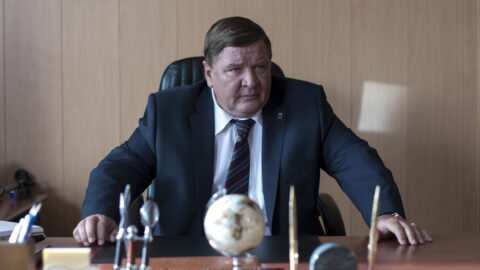Film of the Week: The Fool
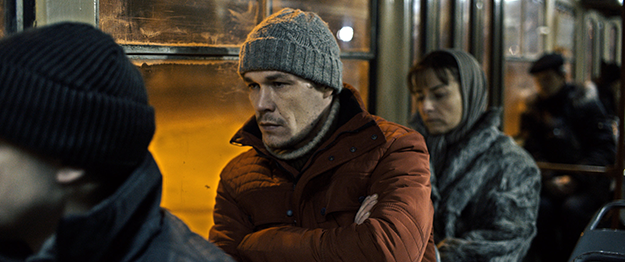
Dima the plumber, hero of the new Russian film The Fool is, more or less, the last honest man in town. He’s an idealist standing alone against the system, a prophet bearing a terrible message of catastrophe. He’s very like Gary Cooper’s marshal in High Noon, although by the end of the film, I started to wonder whether he might be Chicken Little. I mean, he has the charts and the tech specifications to show that the sky is falling, but are we meant to believe that he’s sufficiently qualified as a meteorologist to know for sure?
But the falling sky—or to be more exact, a collapsing building—is partly a metaphor for the state of Russian society in Yuri Bykov’s film. The Fool (Durak) feels like a realist counterpart to Andrei Zvyagintsev’s Leviathan, more accessible as mainstream drama, and more pragmatically critical of a tainted system—although not nearly as resonant as cinema. Its hero, played by Artem Bystrov, is Dima Nikitin, a young plumber in an unnamed provincial town; he’s studying intently for a higher degree (in structural engineering, as far as I could determine), and filling a post as repair crew chief on local housing blocks. One night, he’s called out after a pipe bursts in a crumbling apartment building, or “dormitory.” He notices a large crack that goes all the way up one side of the building—and down the other. He peers into a crevice at the foot of a wall: two bricks plummet down. Later, he realizes that the building is leaning a full 10 degrees to one side—nicely illustrated by the image of a bottle rolling on the sloping roof surface. Naturally, he runs to warn the authorities; and naturally, that’s when his trouble begins. He looks for the city’s mayor, Nina Galaganova (Nataliya Surkova) and finds her at a local restaurant, being feted on her fiftieth birthday, the local dignitaries raising a toast to the woman they all call “Mama.” It’s not the ideal time to receive a visit from a doomsaying plumber.
The Fool begins with a terrifically executed sequence, a domestic squabble that starts nasty and turns nastier, on a floor of the dormitory. In one of the film’s numerous tightly executed long takes, the camera squeezes with its characters up and down a corridor and in and out of apartments, an environment that feels more like a crawlspace than actual living quarters. Bykov and DP Kirill Klepalov use this claustrophobia masterfully to evoke housing facilities that are basically high-stacked rabbit hutches for people written off by society: families on the breadline, alcoholics, the old and confused, youth without a future. By contrast, Dima’s own home, which he shares with his parents and his wife and son, is frugal but a cozy family nest. Then there’s the palatial space of the restaurant where Galaganova holds court—the camera following Dima as he searches for her in the crowd—and where much of the film’s drama is concentrated. Emergency discussions about the dormitory take place in the restaurant’s private room, disco bass throbbing through the wall—this is a party which no catastrophe is going to stop.
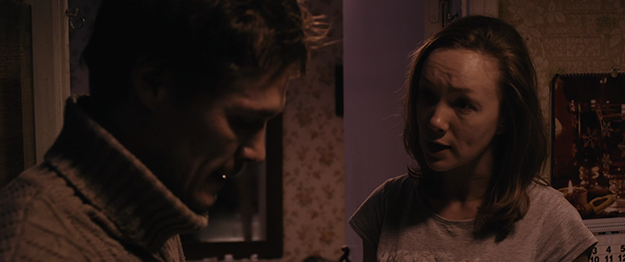
It’s partly the camerawork and the use of space that make The Fool cinematic—along with some very good acting. But all of that is offset by a too explicit script that turns long stretches of the film into whatever is the administrative equivalent of a courtroom drama (a council-chamber drama?). Bykov is capable of strong, economical images such as those two bricks dropping, but the dialogue can make it seem as if he’s dropping a whole ton of them on you.
The film’s overt debate on social corruption vs. moral responsibility is flagged as soon as we meet Dima. His mother (Olga Samoshina) thinks he’s wasting his time with school studies, and that he’s a fool for entertaining noble ideals. She feels she knows the score, as a former doctor who has ended up as an office cleaner. It just happens that Dima takes after his well-meaning father (Alexander Korshunov), a retired crane operator; the old man became a pariah at work because he refused to steal. Regardless, Dima and his dad try to do right; they’re constantly fixing the bench outside their apartment, every time it’s smashed by the local youth. We sense fairly quickly the bottom line of The Fool: that you can put the interests of your community before your own, but no one will esteem you for it (except the viewers of the film you are a character in).
Much is said, and many points delivered bang on the nose in these early scenes in Dima’s family. Bitter home truths are delivered, again and again, with various degrees of emphasis, when Mayor Galaganova gathers her colleagues to discuss the current crisis. The imminent collapse of “32nd Dormitory, District A” isn’t primarily a safety concern for the assembled grandees, but rather an embarrassment that threatens to expose their corruption. The building has been neglected for 30 years—which takes us back to USSR days—because those responsible for it have been creaming off municipal funds. The city’s great and good have been doing very nicely, as witness the grandeur of Galaganova’s big evening: she appears, stately as a duchess in wine-red finery, with a faint touch of Margaret Dumont.
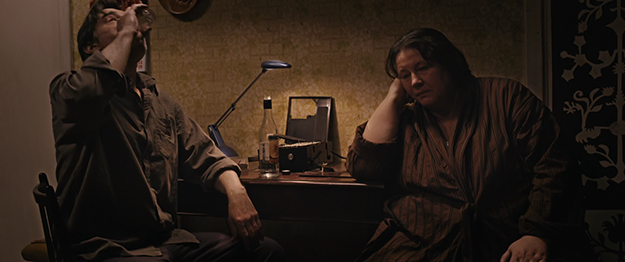
An hour into the film, the authorities admit that Dima may be right about the building collapsing with its 820 residents inside—but what then? The talk goes on. Galaganova holds forth about the tough times she’s known during her rise to the top: “I’m constantly under stress. I lived in fear for my life through the Nineties.” They all talk about how bribery is a fact of life, and always was, in the Soviet era too. “Whose hands are clean here?” someone asks rhetorically, in a film gushing with rhetoric. The most menacing figure here is a bald, Cossack-mustached elder statesman, played by Yuri Tsurilo—whom you may remember as the man-mountain martyr-hero of Aleksei German’s Khrustalyov, My Car!. When Galaganova decides that the population of the dormitory need saving, he retorts, “When did you start worrying about the people? Only when 800 might perish at once? Were you worried about them when they were dying one by one?”
This is a pithy bit of dialogue, but much of the time, Bykov is writing a pamphlet rather than a script. For example: “There’s not enough of the good life to go round. Divide it evenly and nobody will get anything.” Bykov gets his point across far better when he does so with simple images: when Tsurilo’s character asks Galaganova, “Are you with them, or with us?”, she looks round and we see one of “them,” Russia’s unwashed, asleep (or dead) on a bench in the snowy night. Yet often a pall of stylistic awkwardness hangs over the many empathic moments of truth. When Dima heads off on his mission, the camera tracks him from the side as he strides through the night to an abrasive rock song that sounds like an Eighties stadium number (the bellowed chorus goes: “Spokoynaya noch!”—”Quiet night!”). Sometimes you wince at the histrionics: at one point in the restaurant, a character rages on the dance floor, the music stops and all the revelers turn round in perfect sync, right on cue, to stare.
The Fool is desperately stagy—but then why shouldn’t it be? One of its closest relatives, after all, is An Enemy of the People, Ibsen’s drama about another whistleblower who got no thanks for his social conscience. Yet there’s no denying that The Fool packs a punch, and makes an often gripping watch—and Bykov certainly drums up a palpable mood of apprehension with his simulation of real-time drama unfolding over a narrow stretch of time, over a single night through to morning. The film is atmospheric, the restaurant scenes having an oppressive huis clos feel that suggests a certain influence of the Romanian school of claustrophobia (Child’s Pose, the hotel scenes in 4 Months, 3 Weeks…).
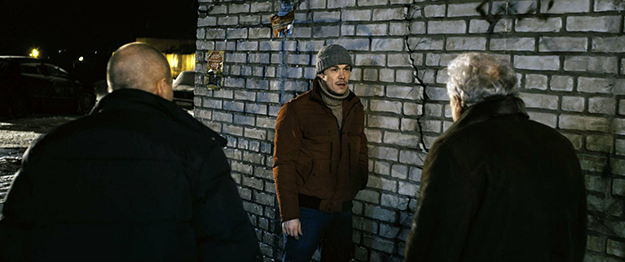
And there’s the cast: Tsurilo, who’s all the more terrifying for his quizzical detachment through most of the action, and Surkova, whose mayor is positively regal in all her venality and bad faith, with a fiery grace that suggests a Lucrezia Borgia who has been unafraid to look into her soul now and then. As Dima, Bystrov—who remains silent, ruefully looking on for much of the time—conveys urgency, integrity, silent nobility. His working-stiff toughness has a touch of Mark Wahlberg, but Bystrov also reminds me of those noble square-jawed heroes of Soviet-era cinema, and I wondered how much of a conscious decision that was on Bykov’s part—and what ideological resonances that might conceivably carry?
I also wondered at the end whether Dima entirely knows what he’s talking about when it comes to structural stability—whether he is indeed a fool after all. Russian culture likes its fools, usually of the saintly, unworldly sort, the effete, epileptic, childlike Prince Myshkin types. The word durak, however, suggests something more stubborn and sturdy, someone thick as a plank, and as unbending. The Fool doesn’t actually end this way, but you could imagine a final shot in which we see Dima, Samson-like, rolling up his sleeves to personally hold up Dormitory 32, and Russian society itself, until his arms give out.



